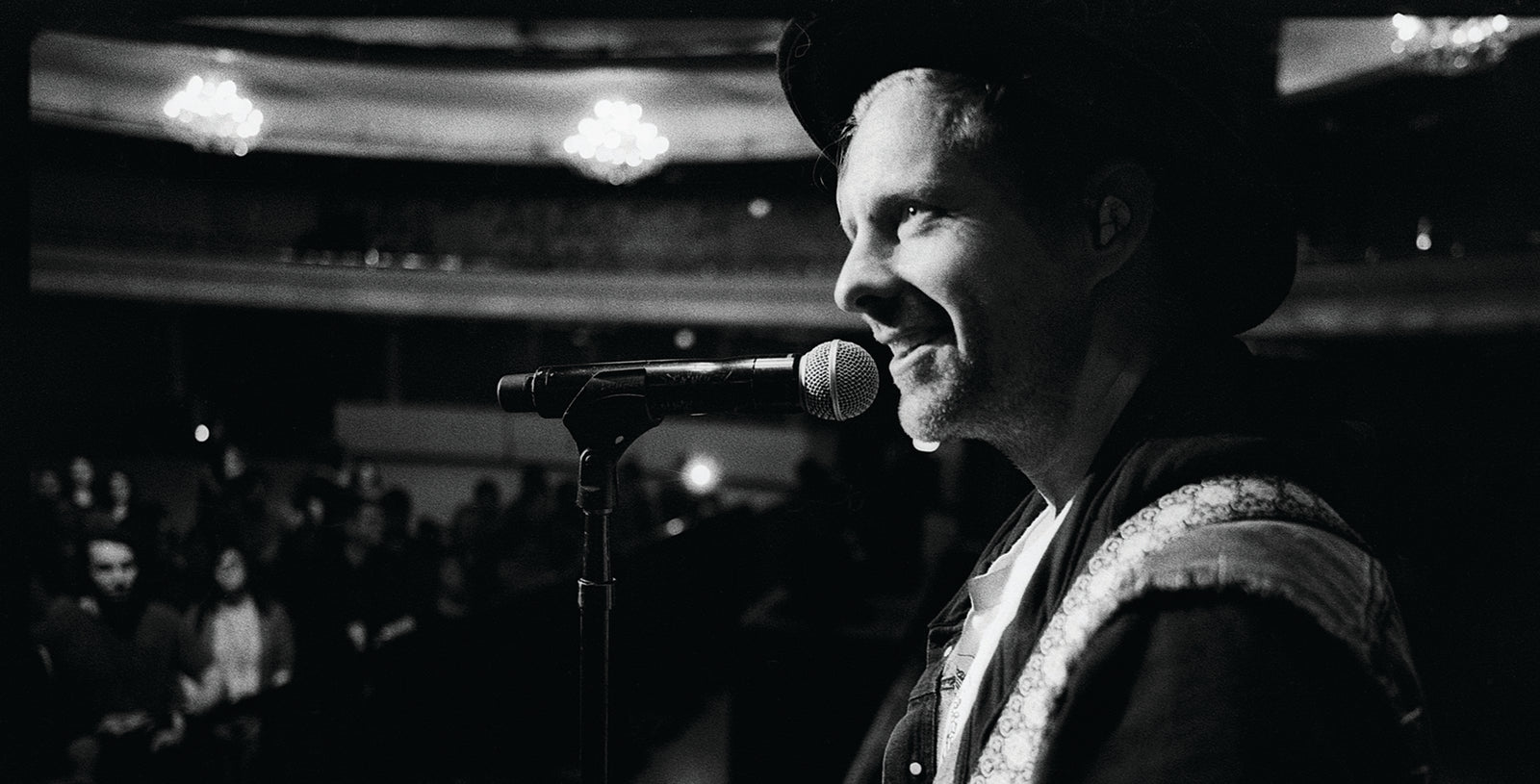WHERE DO YOU FIND HOPE?
DEEP TALKS WITH DAVID DARK - A CONVERSATION BETWEEN FRIENDS w/ DAVID DARK & JON FOREMAN
JF: You've taught all sorts of humans- high-schoolers, college folk, men and women in prison, what is the most rewarding aspect of teaching?
DD: For better or worse, I love trying to talk people out of their own boredom. And even apart from landing the job as a paying gig, I'm still always trying to see what people are reading, watching, and listening to and wishing they'd talk to me about it. "You should check this out," is my love language. I want to know what strangers are loving. I think I could look over people's shoulders at libraries all day long. I suppose teaching is one way of maneuvering this obsessive compulsion into something more social, a ritual that might be of help to someone, the work of helping people find themselves and other more interesting. There's a wonderful line on that 1st Wilco album: "I can't find the time to write my mind the way I want it to read." When I teach (or try to teach), I'm inviting people to take on the task (the joy, the essential and sanity-restoring discipline) of accessing and articulating their inner life (their own thoughts) into something that satisfies them. I hope to help them lift their own voices-their own thinking-one sentence at a time. It usually involves essays, science fiction, the Bible, and lots and lots of poems. The most rewarding moment is when I see someone coming to believe that their own voice is worth lifting up.
JF: What have your students taught you?
DD: That learning is always a group activity. That all eloquence is borrowed. That peer pressure is forever. My personality is such that I'm sorely tempted to try to fill up silences with my own monologue, but a class in which my speech passes the 50% mark when compared to the sum of everyone else's is a class that probably went very, very badly. I have to wait students out sometimes, and not waiting is perhaps my biggest fail. They've taught me that real insight, real learning is relentlessly communal. I find that my writing suffers, has nowhere to go really, if I'm not involved in open-ended conversation. My best material comes from the back-and-forth whereby my peer-mentors (sometimes called students) let me know I have yet to express myself clearly and succinctly.
JF: Our mutual grandmother-in-law once told me the three things you're not supposed to talk about in casual conversation were sex, politics, and religion. And yet you put the word "religion" in bold print on the cover. Why do you think people are afraid of talking about religion?
DD: People are often afraid to get into it with each other, and nothing gets into it like religion. Nothing so effectively threatens the perceived calm. With words like "politics" and "religion" and "the media" we desperately hope we might cordon the chaos for at least a little while during family reunions or thanksgiving meals, but then there's the messy fact of our online footprints, what we do with our money, and how we talk about people, the lives we're all each living. Your religion-mine too, for better and worse-is just the story your one life tells. It's your witness, the shape your loves and hates take. We are, each of us, our own media network, sharing (or not sharing) what we're thinking and finding. There's nobody else to blame. We get to be the politics we want to see in the world. I don't think real love begins till we hold out the messy fact of what we're really up to and into with open hands. Eventually, we get to stop fronting. We have to. As MC Breed once noted, there's no future in your fronting.
"I DON'T THINK REAL LOVE BEGINS TILL WE HOLD OUT THE MESSY FACT OF WHAT WE'RE REALLY UP TO AND INTO WITH OPEN HANDS" - DAVID DARK
JF: You're understanding of religion is so broad, encompassing all of the human experience- from how we vote, to how we drive, to how we recycle. It all matters, "all religion, all the time," from how we use technology to how we treat other human souls. And yet, this broad understanding of what matters can be overwhelming. Everyday we read stories of poverty and injustice, greed and pollution from all over the world. And it can be paralyzing. How does one begin to live out this bold, all-encompassing religion? How do you stay present, when it feels easier to become numb?
DD: It can indeed be overwhelming, and the drive to divide (This is my business. This is my faith. This is my politics. And this over here is just personal) is understandably everywhere. But I think the heavier burden is a life of denial, a life hellbent on insisting that one thing has nothing to do with the other, one in which we're always trying to con ourselves and others into not paying deep attention to the whole. Or as the great and powerful Oz put it: "Pay no attention to the man behind the curtain!" We're not really loving or having compassion on ourselves when we devote so much energy to compartmentalizing our world. Martin Luther King Jr. gave us an amazing phrase for identifying the fact of relationship in all things. He noted that upon drinking coffee, eating eggs, drinking orange juice, and reading a newspaper, he's immediately immersed in deep dependence upon the labor of others people, individuals to whom he owes a debt beyond whatever he paid for these things, humans with whom he's in relationship. He's caught up, he said, in an inescapable network of mutuality. Being alive to it, presuming deep kinship with other people at every turn, is the livelier, more joyful, more excellent way of being alive. To be present to kinship (a living fact, not an issue) is to dwell realistically and poetically within the world. It's a day-by-day decision. I need music and film and lots of deeply attentive friends if I'm going to get it right even some of the time. It's a lifelong process. Or to flip the script on the words of our new President, no one can fix it alone.
JF: Your family iPod has always brought me joy- songs from many decades and genres mingling together. Are there any tunes that have surfaced recently that have had an impact on your daily journey?
DD: Well...we as a family have found it very difficult to stop the feeling (or feelings) that seize us when we hear a song called "Can't Stop The Feeling!" by the indie artist Justin Timberlake. It has us dancing almost daily. We find the video persuasive too. I suspect it comes down to certain feelings we all have in our bodies. We're also still loving Chance the Rapper's Coloring Book. I saw Will Marsh's band Gold Connections in Charlottesville a few weeks ago and found them amazing. Simple Minds is getting us moving again. Sarah Masen's music continues to shape my understanding of the world. And we're both endlessly enamored by the witness of Judee Sill. Her song "Abracadabra" keeps breaking our hearts and restoring our senses. There's also the gift to our species that is the soundtrack to Stranger Things.
JF: You and your wife Sarah are both actively creative souls- writing books, making pottery, recording albums, etc... All the while, you each have a day job and are raising three amazing kids. How do you integrate all of this together, how do you make it work?
DD: We often recall an Ursula K. Le Guin line that goes a little something like this: Nobody can do two jobs, but two people can do three. We get to level with one another anew each day. We have to come out of hiding probably many times in our waking hours and try to be truthful about what we're feeling and taking on and worrying about. We read Howard Thurman and Parker Palmer and Pema Chödrön aloud to each other. We try to answer our kids' questions honestly and non-formulaically. We're getting better at saying we don't know or don't understand something when we don't. We avoid haste. Resist defensiveness. And we try to keep each other laughing.
JF: Where do you find hope? Where does the light shine through?
DD: I feel hope whenever I see that the person-maybe a whole series of people-cleaned up after themselves before I entered the bathroom stall, when people in cars decide to be good to each other, when strangers giggle together in lines in restaurants, when families and neighbors who don't know one another march together against degradation and on behalf of the vulnerable. The Women's March for instance, in Nashville, D.C., and all over the world, gave me great hope. I see the light shine through whenever I change my mind about someone or something. What politicians call flip-flopping the Bible calls repentance, and there's no life without it. No unity, as Alex Medina says, without repentance. No future till we seek forgiveness from the people we've wronged. Relatedly, I see light shining through whenever we find ourselves ridiculous, as that amazing song from James ("Sit Down") puts it, whenever we put on the mantle of the merely human one more time, when we let go of every front, whenever I feel deep affection for someone I once found threatening. Any day that happens is a very good day.



